Shacham Ohana: "I Knew Nothing About Judaism, and One Night Something in Me Broke"
He played with top artists, lived in Tel Aviv, moved to the desert, and then leaped to New York, knowing there was something about Judaism that drew him. But only in Belgium, married and a father, did he find the courage to fully commit.
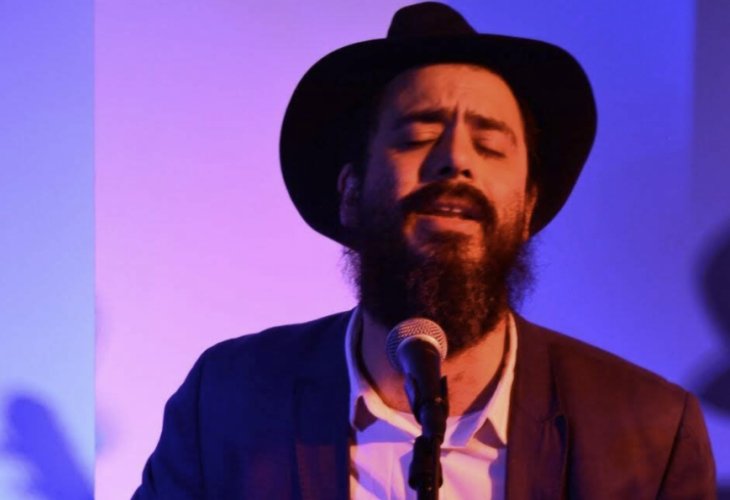 Shacham Ohana, bass player
Shacham Ohana, bass playerFor many years, he had what he called a "romance" with Judaism but didn't dare take it a step further. He played with the country's most famous artists, made a living from music from a young age, and lived as a bachelor in Tel Aviv, without any thoughts of returning to religion. The moment he decided to go all the way with it was actually in Belgium, with his wife and daughter, where he discovered the true light of Hashem, and since then, he has flourished, both in Judaism and music.
Today, Shacham Ohana (42) lives in Alfei Menashe, far from his days in Neve Tzedek, where he first took steps toward religion. He was actually born in Jerusalem, and when he was in second grade, his parents moved to Kfar Saba, where he grew up until he enlisted in a military band. "I connected with music from a very young age," he says. "My dad played guitar, and my grandfather had an organ that I played on. As I grew older, I studied at Alon High School in Ramat Hasharon in the music program. I abandoned the organ and started playing the bass guitar. That's where I really began to learn to play professionally."
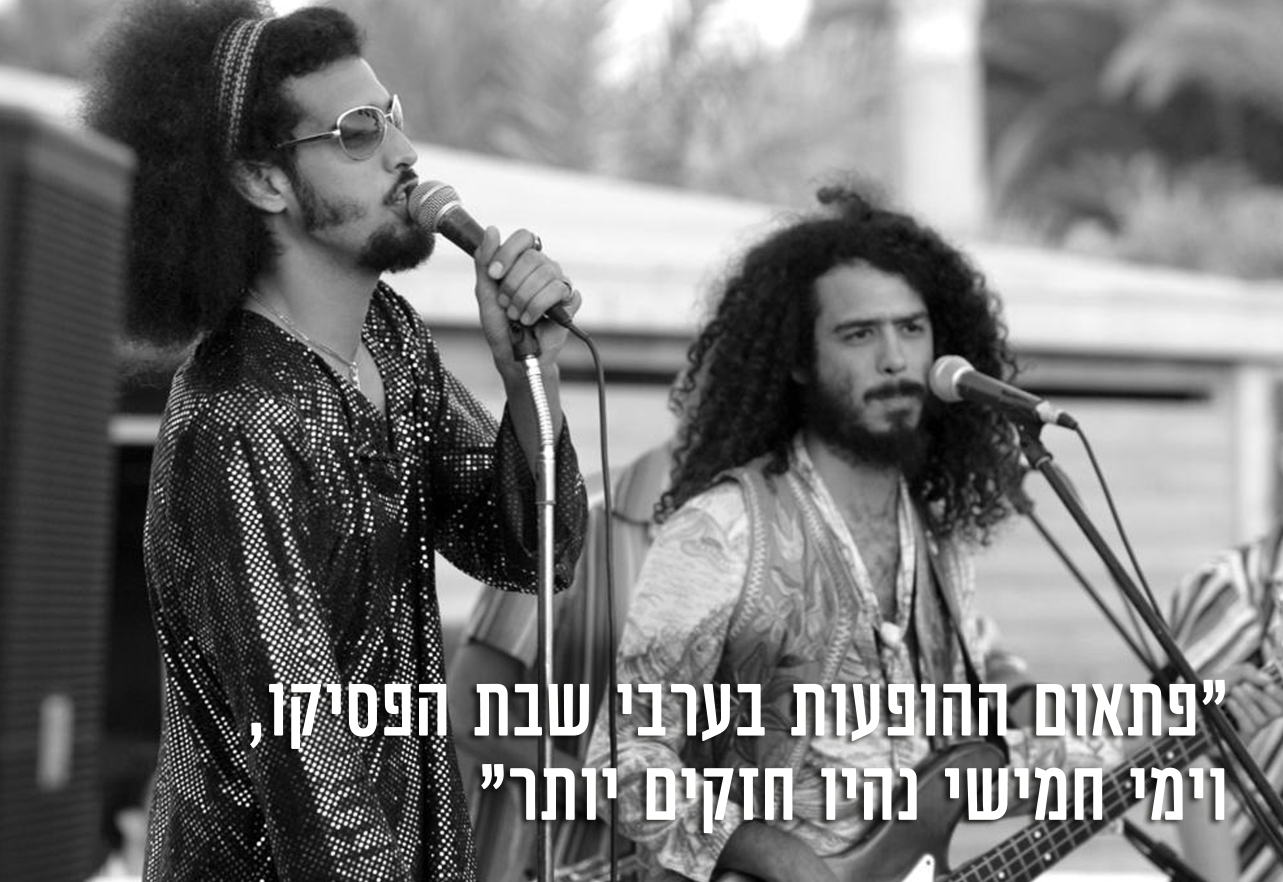
After he completed his studies, it was only natural to continue serving in a military band. There, he met prominent names in the music industry, and immediately upon his release, young Shacham played with the most renowned artists in the country, such as Rami Kleinstein and Rita, Dana Berger, Riki Gal, Ariel Horowitz, Shotey Hanevua, Karolina, and more. He worked on many projects and, at the same time, was part of the band Funk'n'stein, a pioneering groove and funk band founded as a cover band in 1998 by Elran Dekel and Guri Alfi.
In a world based on external appearances, what led you to search for something more internal?
"My journey with music led me to a spiritual search. When you're on stage, playing, you begin to lose yourself, entering a meditative state, which is a very spiritual experience. I was always interested in spirituality, in India, in Buddhism, but I was never truly captivated by anything. Judaism wasn't even an option. At home, the holidays were marked with meals, and that was it. I grew up without much fondness for religious people. I remember going to memorial services in synagogues and seeing people asking for charity donations. It seemed like a business to me, the rabbis seemed tough, and it really didn't speak to me."
"I Slept in a Tent in the Desert, I Was Happy With Life"
Despite his curiosity about Eastern spirituality, he didn't manage to take the big trip after the army. "Right after I was released, I got calls to come play. It snowballed quickly, and *Baruch Hashem*, many things started happening. I didn't feel like I was missing out, I felt like I was set free. I left home, moved to Tel Aviv, and I wasn't desperate to fly abroad. I didn't even feel the need to search for myself; Hashem helped me find myself. Music captured me, and I started to make a respectable living. I loved it."
Shacham's change came from an unexpected place. At the height of his success, he moved to live in Neve Tzedek, right above a neighborhood synagogue. "Every time I passed by, the rabbi would say to me, 'Tzadik, come sit with me a bit.' It didn't happen very quickly, but one time I agreed to come in and sit with him. He began to lay out the spiritual elements of Judaism that I didn't know existed. I remember one day someone passed by and saw us, and he asked the rabbi why he was teaching me this stuff, and the rabbi replied, 'If not him, then who should I teach?!' He simply revealed a new world to me, things I didn't know before, and then I began the process of coming closer."
Shacham started working on his first solo album, released in 2006, and experienced things he hadn’t before. "I started coming to the synagogue occasionally, observing Shabbat here and there, but I knew nothing about Judaism. I needed to be taught how to put on tefillin, what the Amidah prayer was, literally everything. One evening I came for prayer and suddenly started crying. I will never forget it. Something in me broke, and I felt a kind of inner longing for Hashem. That's basically where it all began."
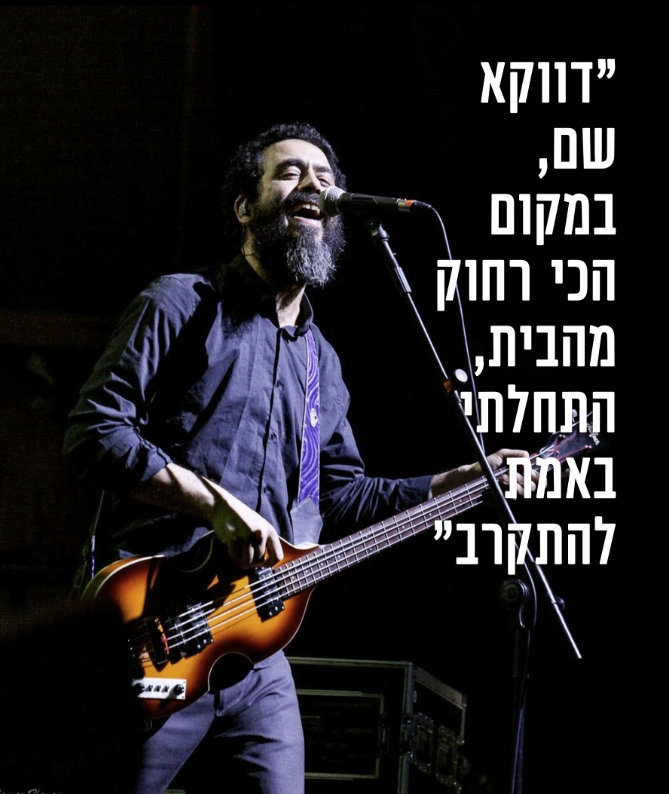 Photo: Tamar Hanan
Photo: Tamar HananIt started, but not exactly. Shacham began to frequent the neighborhood synagogue, sporadically put on tefillin, occasionally practiced Shabbat, and according to him, had a kind of romance with Judaism. One day, he went to visit a friend in Shaharut in the Negev and fell in love with the place. "A good friend of mine started running a khan there and invited me to visit. When I arrived, I simply fell in love with the place. At that time, I had a desire to disconnect from everything, and moving there seemed like the most logical thing to do. I started working in his kitchen, baking pitas, sleeping in a tent, and was happy with life. I sat in the desert, began to pray alone, shouting to Hashem. That's when I really began to strengthen in prayer, but I still didn't take on any more mitzvot, even though I was good."
Where did this drastic change come from?
"It's just my nature. I love drastic changes, and the place charmed me. It had amazing scenery, an amazing atmosphere, and a very powerful desert silence. My next change was even more drastic. After a year in the desert, I got a call from a friend who had moved to the U.S., telling me he was working in prestigious studios in New York, and invited me to come. So, from the desert, I moved to Brooklyn. It took me six months to realize it wasn’t the place for me. I had fun, performed, worked, but the place felt cold and impersonal, so I returned home."
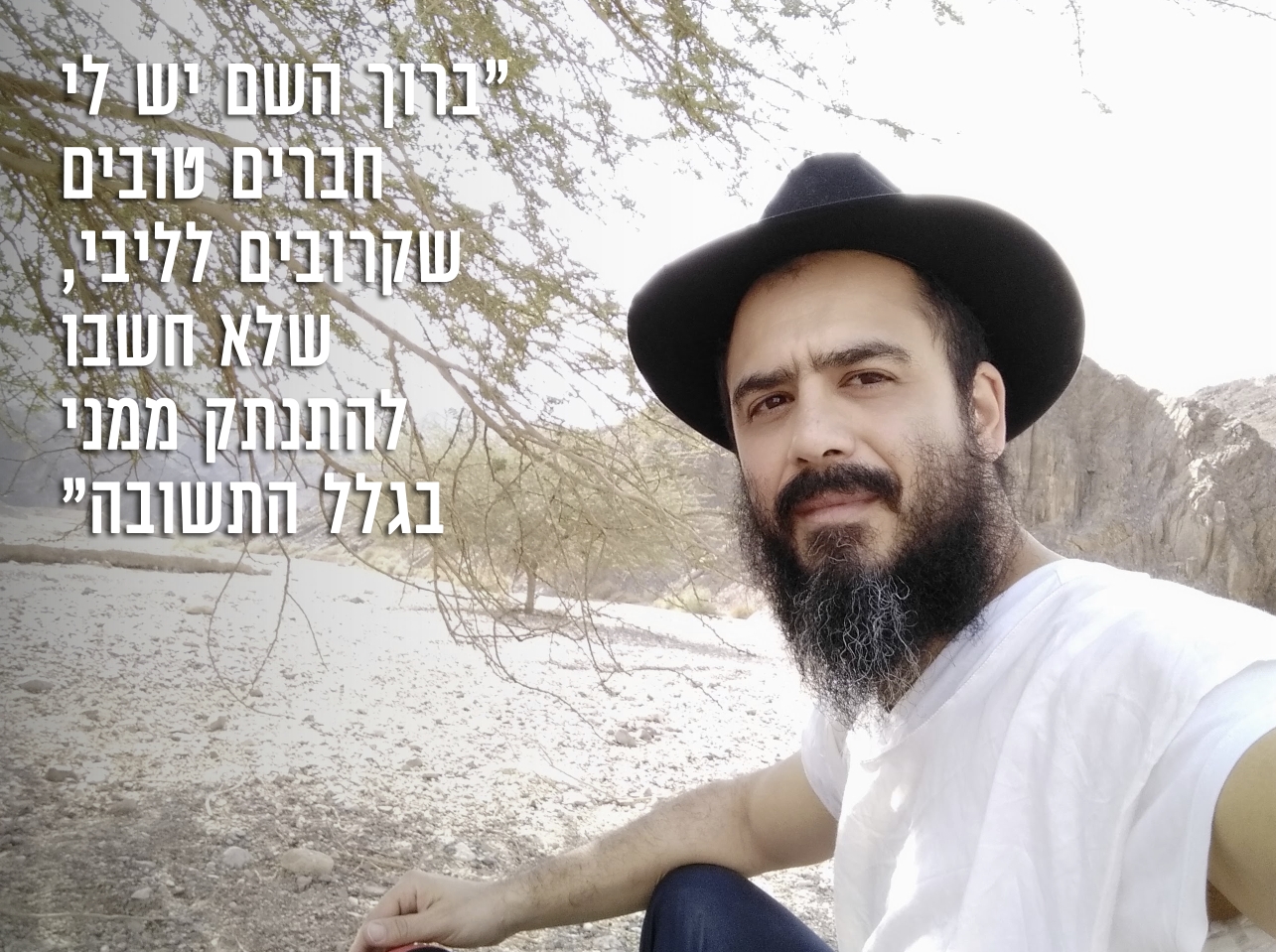
"It Was In The Most Distant Place That I Started To Draw Closer"
At 29, Shacham returned to Israel, to music, with long hair and a rock and roll vibe. There wasn’t anyone to accompany him in his internal process, and life continued as usual. Then he met Hagit, his future wife, and she helped him reconnect. "Hagit grew up in Bat Yam, in a home where her father returned to Judaism, and she accompanied him through the process. She observed Shabbat from about age 6, though outwardly, we both looked like typical Tel Avivians. Before we got married, she began attending Torah classes and met a rabbi who eventually married us. In hindsight, we had a completely Chabad wedding without realizing it. After the wedding, the rabbi who helped us suggested a Tanya class. When I attended, I suddenly felt a new light entering my soul. I really started to feel at home, getting answers to my questions; it was like a puzzle coming together."
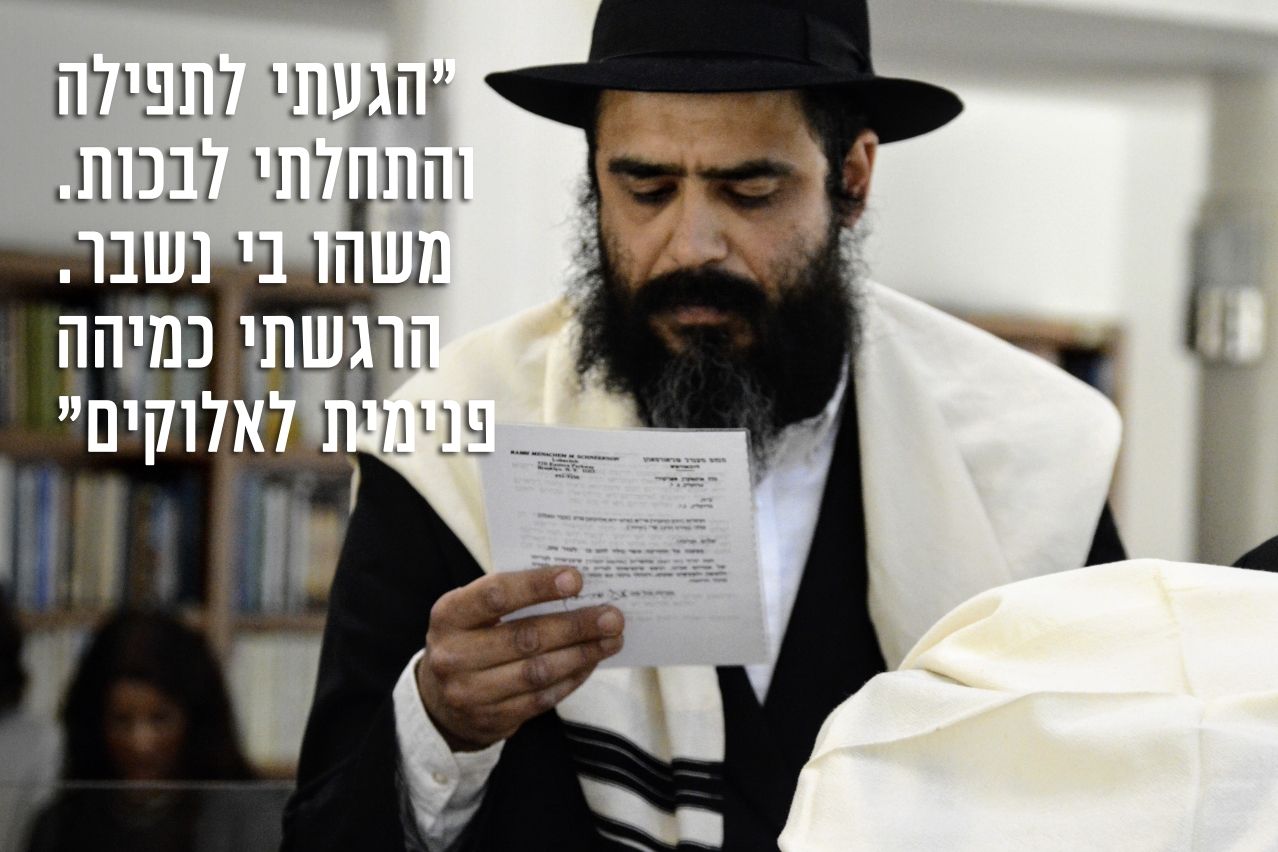
Shacham began regularly attending Tanya classes every week, and meanwhile, their first daughter was born. "But then Hashem delivered the serious blow," he laughs and says: "My wife got a job offer from her boss to move to Belgium for a few months with me and the child. I went along with it, and it was precisely there, in the most distant place from home, that I really began to draw closer."
In Belgium, Shacham and his wife connected with the Chabad community and suddenly discovered the beauty of Judaism. "Abroad, the Jewish issue comes out. It's not like in Israel where everyone is Jewish and there are synagogues everywhere. Suddenly, when you're among non-Jews and see a synagogue, it's special. All the masks and screens fall away. You just look for someone to say, 'How are you? Come to my home, we'll host you.' And indeed, we got to meet an amazing community. We came for work, but what we gained was much greater. I was already quite strengthened. I prayed three times a day, wore *tzitzit*, dressed in black and white, everything. It was a change from one extreme to another."
Do you remember the turning point when you decided to fully commit?
"A lot of things. It’s the distance from home and your previous reality, the Chabad melodies, my Shabbat experiences in the synagogue, the songs that got into my veins. I would wake up in the middle of the night and start singing them in my sleep. My wife was at the same point. Her whole life she wanted to strengthen her faith, but it never happened, and suddenly there it burst forth."
How did the spiritual growth align with music? Performances on Shabbat? Did you even think about it?
"That was always the hardest part preventing me from progressing. Every time I began to draw closer, I remembered I’d have to observe Shabbat and told myself, ‘No way, it's not going to happen. I have gigs on Shabbat, it doesn't seem realistic to me.’ But *Baruch Hashem*, suddenly the Friday night performances stopped, and Thursdays became more common. When we went to Belgium, it didn't bother me anymore. I was far from home anyway."
"There Isn't Really a Place for Those Returning to Religion"
Before they returned to Israel, family and friends understood something was happening with Shacham and that he would return a bit... different, but it didn't bother Shacham. "It’s different to return to religion as a family. I see it with friends who return alone, single. We returned to religion, and that’s it. We started our life together. I didn't care what others thought of me. Even today, I don't have many friends. Two or three good friends, and that's enough for me. Someone once told me there are friends who are there for fun, but when the fun ends, and you really need to talk, they’re not there for you. *Baruch Hashem*, I have good friends close to my heart, who didn’t think to cut ties because I'm religious. I do say my circle of friends has gotten smaller, but it was kind of a natural process. We built a family with four kids, entered the whirlwind of life, so who has time for friends?!"
Still, didn't you want to connect to a specific community, feel like you belong? "In my view, those who return to religion stand on their own. There are those who connect to specific communities like Chabad, Breslov, the Sephardic stream, or the Lithuanian stream. Our kids were born into religious life. But we still listen to music from all genres. True, Hasidic melodies are strong in our home, but there are other things that play. “I’ve been playing with Ishay Ribo for five years. I heard he was a rising star and couldn’t believe how he only kept getting more successful each year. We were on a crazy ascent until the coronavirus festival began."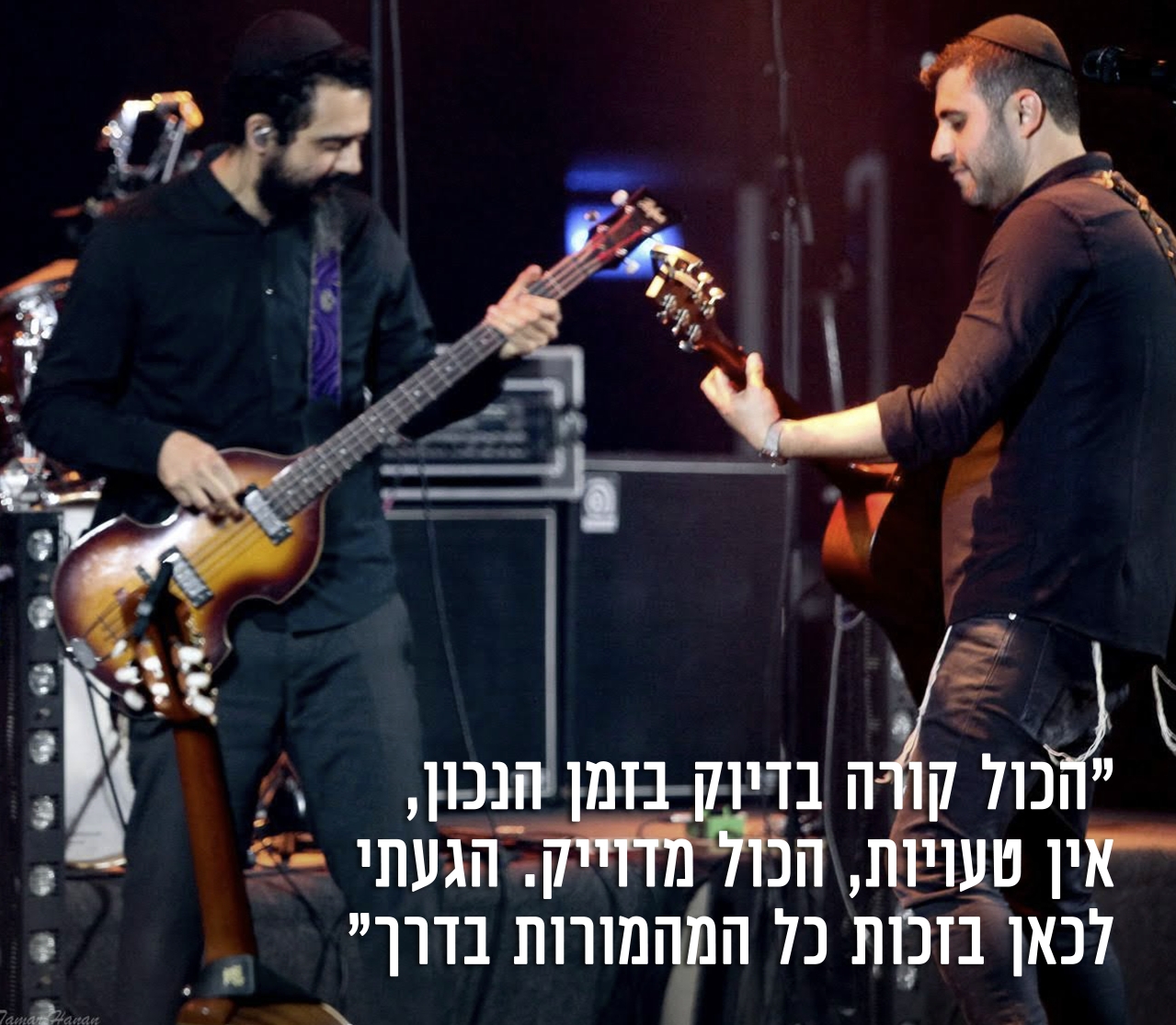 Photo: Tamar Hanan
Photo: Tamar Hanan
After becoming religious, did you think of quitting music at some point, or was it clear you would continue?
"From the beginning, the rabbi told me not to give up on music. It seemed unrelated to abandon it. When I returned to Israel, I stopped performing with Funk'n'stein and Karolina. At first, I ignored it, taking things slowly, but eventually I realized I couldn’t keep on, that it didn’t align with my way of life. Luckily, I had friends who also returned to religion who advised me to progress little by little, telling me not to make decisions just because I'm now religious but because it comes from a genuine place I'm connected to. I came to the conclusion on my own that I needed to leave. Today, I play with Ishay and perform more than I ever have."
But then COVID-19 hit and changed everything. Shacham decided to use the time to record his third album, “Living Now,” most of which was recorded and mixed at home. On the album, he plays most of the instruments, and according to him, this is the first time he releases very raw material without much editing. "It's a desire that existed in me for years but was never fulfilled. Artists always wish to improve and record in a big studio with musicians and production, but I always felt there was a special spark in the raw recordings, something that gets lost when production starts."
Eight years have passed since the beginning of his return to Judaism, and he emphasizes that drawing closer to Hashem is a lifelong process. When I ask if he regrets not starting earlier, he replies, "If I want to be truthful, then I’d say everything happens at the exact right time, there are no mistakes, everything is precise. Of course, there are things I would have done differently, but I think I got here thanks to all the obstacles along the way."

